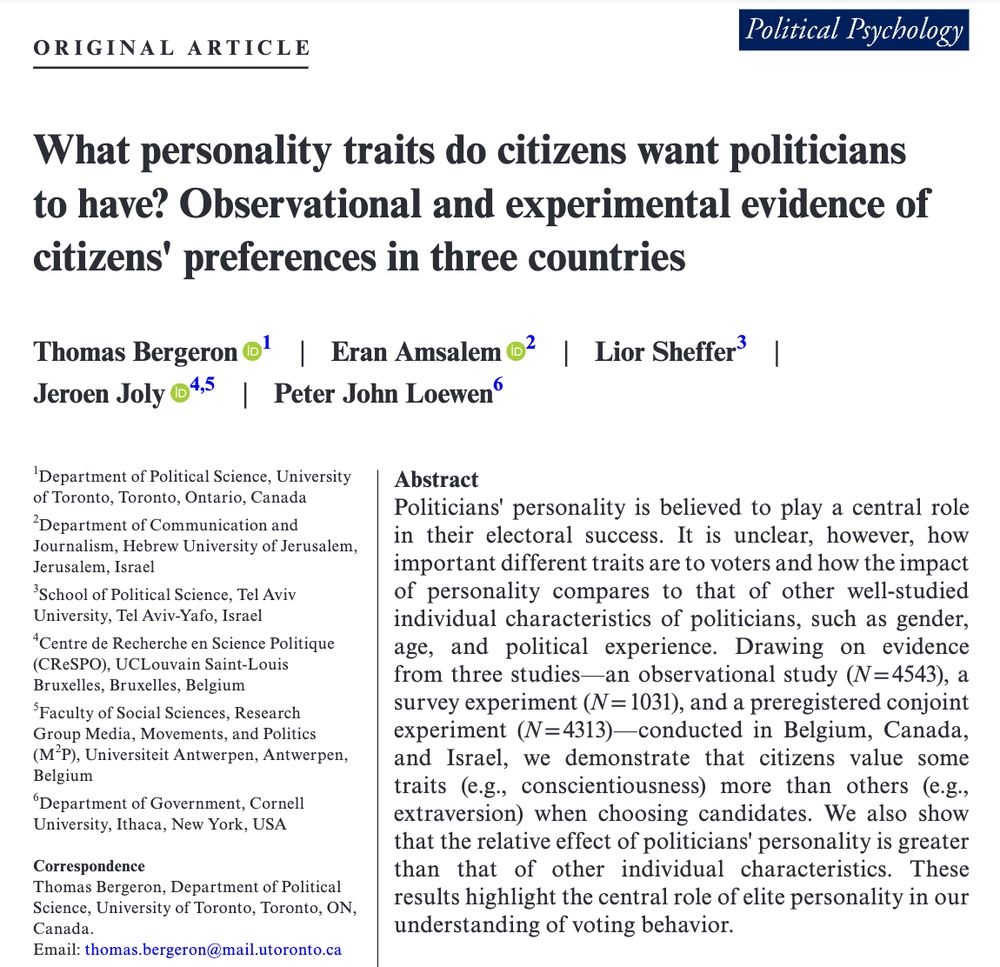
Lior Sheffer
@liorsheffer.bsky.social
Political scientist at the Tel Aviv University. I study elite political behaviour.
https://sites.google.com/site/liorsheffer/
https://sites.google.com/site/liorsheffer/
High levels of openness to experience, which characterize most politicians exhibit, are only weakly appealing, especially among right-leaning voters. In a conjoint experiment, we find that these effects on leader preference outweigh factors such as age, education, gender, and experience. /3

June 5, 2025 at 10:56 AM
High levels of openness to experience, which characterize most politicians exhibit, are only weakly appealing, especially among right-leaning voters. In a conjoint experiment, we find that these effects on leader preference outweigh factors such as age, education, gender, and experience. /3
We find remarkable consistency across countries and ideologies when citizens choose their party leaders: they are extremely averse to displays of neuroticism, and strongly reward candidates who are conscientious, agreeable, and to a lesser degree extrovert /2


June 5, 2025 at 10:56 AM
We find remarkable consistency across countries and ideologies when citizens choose their party leaders: they are extremely averse to displays of neuroticism, and strongly reward candidates who are conscientious, agreeable, and to a lesser degree extrovert /2
Now in @ispp-pops.bsky.social: what type of personality do citizens want their leaders to have? In a series of studies conducted in Belgium, Canada, and Israel, we present citizens with profiles of potential leaders with different personality configurations drawn using the Big Five traits /1

June 5, 2025 at 10:56 AM
Now in @ispp-pops.bsky.social: what type of personality do citizens want their leaders to have? In a series of studies conducted in Belgium, Canada, and Israel, we present citizens with profiles of potential leaders with different personality configurations drawn using the Big Five traits /1
This result holds when we ask politicians to think about the general public and their own party voters; under different definitions of seniority; and even when we specifically look at those politicians who are (incorrectly) singled out by colleagues for being good at understanding public opinion. /3


February 13, 2025 at 8:03 PM
This result holds when we ask politicians to think about the general public and their own party voters; under different definitions of seniority; and even when we specifically look at those politicians who are (incorrectly) singled out by colleagues for being good at understanding public opinion. /3
We find that while politicians themselves strongly believe that top politicians - such as party leaders and cabinet ministers - excel at understanding what people want, in reality these senior figures - who were included in our sample of >800 politicians - are just as inaccurate as the rest! /2

February 13, 2025 at 8:03 PM
We find that while politicians themselves strongly believe that top politicians - such as party leaders and cabinet ministers - excel at understanding what people want, in reality these senior figures - who were included in our sample of >800 politicians - are just as inaccurate as the rest! /2
Now in @bjpols.bsky.social: Are leaders really better at reading public opinion? In a large-scale study led by Stefaan Walgrave and Julie Sevenans, we test the assumption that politicians in leadership positions have more accurate knowledge of public opinion than others. /1
doi.org/10.1017/S000...
doi.org/10.1017/S000...

February 13, 2025 at 8:03 PM
Now in @bjpols.bsky.social: Are leaders really better at reading public opinion? In a large-scale study led by Stefaan Walgrave and Julie Sevenans, we test the assumption that politicians in leadership positions have more accurate knowledge of public opinion than others. /1
doi.org/10.1017/S000...
doi.org/10.1017/S000...
In the paper, we argue that politicians' theories of voters are very likely consequential for how they campaign, communicate, think about public policy, and represent constituents. We also outline a new research agenda stemming from our findings. Lots more in the paper! /4


November 4, 2024 at 3:32 PM
In the paper, we argue that politicians' theories of voters are very likely consequential for how they campaign, communicate, think about public policy, and represent constituents. We also outline a new research agenda stemming from our findings. Lots more in the paper! /4
Only 16% of politicians are "democratic optimists", who see voters as knowledgeable, fair assessors of blame and credit, who care about the long term and society as a whole when voting. Citizens, on the other hand, are equally split between optimism and realism in their views. /3

November 4, 2024 at 3:32 PM
Only 16% of politicians are "democratic optimists", who see voters as knowledgeable, fair assessors of blame and credit, who care about the long term and society as a whole when voting. Citizens, on the other hand, are equally split between optimism and realism in their views. /3
Nearly 75% of all politicians adhere to what we call "democratic realism" - they think that voters are ignorant, short-term focused, egocentric, and vote based on deeply held identities rather than policy positions. This happens in every country we study. /2


November 4, 2024 at 3:31 PM
Nearly 75% of all politicians adhere to what we call "democratic realism" - they think that voters are ignorant, short-term focused, egocentric, and vote based on deeply held identities rather than policy positions. This happens in every country we study. /2
Now in APSR: What do politicians think about their voters? Fielding face-to-face surveys to 982 sitting politicians in 11 countries, and accompanying surveys of 12,000 citizens, we find that politicians have remarkably consistent - and cynical - theories of voters: /1
doi.org/10.1017/S000...
doi.org/10.1017/S000...

November 4, 2024 at 3:30 PM
Now in APSR: What do politicians think about their voters? Fielding face-to-face surveys to 982 sitting politicians in 11 countries, and accompanying surveys of 12,000 citizens, we find that politicians have remarkably consistent - and cynical - theories of voters: /1
doi.org/10.1017/S000...
doi.org/10.1017/S000...
We also show that politicians with office seeking ambitions are more affectively polarized, potentially explaining why top politicians - those who citizens often take affective cues from - may hold especially high levels of partisan animosity. More on implications in the paper!

March 13, 2024 at 12:37 PM
We also show that politicians with office seeking ambitions are more affectively polarized, potentially explaining why top politicians - those who citizens often take affective cues from - may hold especially high levels of partisan animosity. More on implications in the paper!
We find remarkable variation in politicians' affective polarization, with non-partisan politicians being -less- polarized than citizens, but document higher levels among partisan politicians and extreme ideologues. /2


March 13, 2024 at 12:37 PM
We find remarkable variation in politicians' affective polarization, with non-partisan politicians being -less- polarized than citizens, but document higher levels among partisan politicians and extreme ideologues. /2
Now in Political Psychology: Why are some politicians more hostile than others? Do politicians as a group feel more partisan animosity than citizens? @lucasjacklucas and I report results from a study of 850 politicians and 28,500 citizens to provide first answers: /1
doi.org/10.1111/pops.12974
doi.org/10.1111/pops.12974

March 13, 2024 at 12:36 PM
Now in Political Psychology: Why are some politicians more hostile than others? Do politicians as a group feel more partisan animosity than citizens? @lucasjacklucas and I report results from a study of 850 politicians and 28,500 citizens to provide first answers: /1
doi.org/10.1111/pops.12974
doi.org/10.1111/pops.12974
This is not merely an academic debate: these theories strongly predict politicians' in-office choices, such as how many hours per week they spend on different representational tasks. They also have other potential implications that we discuss. /4

January 17, 2024 at 2:03 PM
This is not merely an academic debate: these theories strongly predict politicians' in-office choices, such as how many hours per week they spend on different representational tasks. They also have other potential implications that we discuss. /4
they believe that voters are driven by identity over policy, are unfair evaluators of politicians, and are past- rather than future-oriented. Only about 10% of politicians ascribe to 'folk theory' of democracy that sees voters as capable decision makers. /3




January 17, 2024 at 2:03 PM
they believe that voters are driven by identity over policy, are unfair evaluators of politicians, and are past- rather than future-oriented. Only about 10% of politicians ascribe to 'folk theory' of democracy that sees voters as capable decision makers. /3
Now in @EJPRjournal: Are Politicians Democratic Realists? Social scientists debate whether citizens are competent participants in the political game, but where politicians stand on this question is far more consequential, and yet we know virtually nothing about their views. /1


January 17, 2024 at 2:01 PM
Now in @EJPRjournal: Are Politicians Democratic Realists? Social scientists debate whether citizens are competent participants in the political game, but where politicians stand on this question is far more consequential, and yet we know virtually nothing about their views. /1
We show that once coalition voters found out who they were co-governing with, they immediately began expressing warmer feelings towards those parties, quickly erasing what was until then seen as deep-rooted, ideological dislike. But we also document an offsetting trend: /2

December 4, 2023 at 3:59 PM
We show that once coalition voters found out who they were co-governing with, they immediately began expressing warmer feelings towards those parties, quickly erasing what was until then seen as deep-rooted, ideological dislike. But we also document an offsetting trend: /2
Now in EJPR: Can elections reduce partisan hostility? @noamgidron.bsky.social and I tracked 1,000 voters throughout the 2021 election in Israel, in which Netanyahu was temporarily ousted by a short-lived, improbable coalition whose member parties were highly hostile to each other. /1

December 4, 2023 at 3:58 PM
Now in EJPR: Can elections reduce partisan hostility? @noamgidron.bsky.social and I tracked 1,000 voters throughout the 2021 election in Israel, in which Netanyahu was temporarily ousted by a short-lived, improbable coalition whose member parties were highly hostile to each other. /1
We find that attachment to Netanyahu and affective polarization strongly predict support for the judicial overhaul among coalition voters. Majoritarianism and entanglements with the legal system more weakly predict support, which is in turn not associated with populist attitudes.


September 19, 2023 at 5:30 PM
We find that attachment to Netanyahu and affective polarization strongly predict support for the judicial overhaul among coalition voters. Majoritarianism and entanglements with the legal system more weakly predict support, which is in turn not associated with populist attitudes.
We identify 5 theoretical accounts regarding the underpinnings of public support for democratic backsliding, both in Israel and abroad: personalistic leadership, affective polarization, populism, majoritarianism and entanglement with the law.

September 19, 2023 at 5:28 PM
We identify 5 theoretical accounts regarding the underpinnings of public support for democratic backsliding, both in Israel and abroad: personalistic leadership, affective polarization, populism, majoritarianism and entanglement with the law.
Earlier this year, Netanyahu’s government announced its plan to curtail the courts. Support for the plan is concentrated among coalition voters, but only two thirds of Likud voters-Netanyahu’s party-support the plan. What explains variations in support for democratic backsliding?

September 19, 2023 at 5:27 PM
Earlier this year, Netanyahu’s government announced its plan to curtail the courts. Support for the plan is concentrated among coalition voters, but only two thirds of Likud voters-Netanyahu’s party-support the plan. What explains variations in support for democratic backsliding?
Israel's democratic crisis provides us with an opportunity to explore, in real time, who supports democratic backsliding. Our new working paper (w\ Noam Gidron, Yotam Margalit and Itamar Yakir) examines this issue using original pre- and post-reform panel data. Here's what we find:
osf.io/zxukm/
osf.io/zxukm/

September 19, 2023 at 5:26 PM
Israel's democratic crisis provides us with an opportunity to explore, in real time, who supports democratic backsliding. Our new working paper (w\ Noam Gidron, Yotam Margalit and Itamar Yakir) examines this issue using original pre- and post-reform panel data. Here's what we find:
osf.io/zxukm/
osf.io/zxukm/

